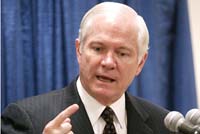No quick deal to be made between US and Czech Republic on missile defense

A senior Czech official said Tuesday that despite Czech Republic strongly supported the idea to host American missile defense system on its territory, it would take more time to negotiate a deal than U.S. officials had hoped.
Tomas Pojar, deputy minister of foreign affairs, told U.S. reporters traveling with Defense Secretary Robert Gates that his government's support is based not only on a shared worry about future missile threats, but also a "moral, historical" sense of appreciation for American support for Czech democracy.
He also stressed that Prague does not intend to rush a deal, and he predicted that it would be difficult to win approval in parliament.
"I think it's going to take a few more months" than the U.S. timetable, which calls for completing negotiations by the end of the year and winning parliamentary approval next spring, Pojar said in an interview over breakfast at the Ministry of Foreign Affairs while Gates was meeting with President Vaclav Klaus.
Pojar said he takes little stock in public opinion polls that show a majority of Czechs oppose having a U.S. missile defense site on their territory.
Gates later held talks with Defense Minister Vlasta Parkanova and was scheduled to meet with Prime Minister Mirek Topolanek as well as with members of parliament with a range of views on missile defense.
The Pentagon wants to install 10 interceptor rockets in Poland which, when linked to a proposed tracking radar in the Czech Republic and to other elements of the existing U.S. missile defense system based in the United States, could defend all of Europe against a long-range missile fired from the Middle East.
Poland's opposition party ousted ruling conservatives in parliamentary elections on Sunday, which is expected to mean some delay in missile defense negotiations with Washington. Nonetheless, Gates said Monday he still believes Warsaw will cooperate.
Gates, asked about possible ramifications of the Polish elections for the Pentagon's missile defense expansion plan, said the United States has enjoyed good cooperation from Poland regardless of the makeup of its government.
The Polish opposition favors hosting a U.S. missile base, but it has criticized the outgoing government for not taking a tougher stance in negotiations.
"I expect that cooperation to continue," Gates said in Kiev, Ukraine, while making no firm prediction. "Obviously we'll have discussions with the new government of Poland in terms of their specific plans. We clearly are hopeful that the kind of cooperation we've enjoyed recently - both in Iraq and Afghanistan on the one hand, and in moving toward negotiating an agreement on missile defense - will continue as before."
Critics say no such system is needed in the foreseeable future because no country in the Middle East, including Iran, now possesses a ballistic missile with sufficient range to threaten all of Europe or the United States.
The Bush administration's negotiations with the Czech Republic and Poland are being run mainly by the State Department.
The U.S. aim is to have both missile defense sites ready for limited operation by 2011 and fully operational by 2013. Russia strongly opposes the U.S. system, including the planned expansion into Europe. Earlier this month, President Vladimir Putin urged Washington to freeze negotiations with Warsaw and Prague.
Many in Congress also oppose adding the two European sites.
While in Prague, Gates also was expected to discuss with Czech officials the future of their country's contributions to the wars in Iraq and Afghanistan. The Czech Republic has troops in both countries. On Monday the government decided, subject to approval by parliament, to reduce its troops in Iraq from 100 now to 20 next year and to increase its presence in Afghanistan from 250 to about 480, Pojar said.
It was Gates' first trip to the Czech Republic and the first by a U.S. defense secretary since Donald Rumsfeld in 2002.
During his stop in Kiev on Monday, Gates set the stage for potentially tough talks later this week at a NATO meeting in the Netherlands by publicly criticizing European members of the U.S.-led alliance for failing to provide the extra troops that their governments promised last year for security duties in Afghanistan.
The main shortfall is in troops to serve as trainers for the Afghan National Army and the Afghan police.
Gates said he intended to pursue the matter at the NATO defense ministers meeting Wednesday and Thursday at a Dutch seaside hotel.
Subscribe to Pravda.Ru Telegram channel, Facebook, RSS!


